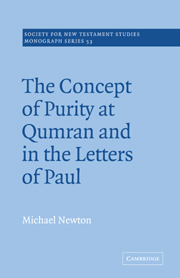
-
Select format
-
- Publisher:
- Cambridge University Press
- Publication date:
- December 2009
- May 1985
- ISBN:
- 9780511555022
- 9780521020589
- Dimensions:
- Weight & Pages:
- Dimensions:
- (216 x 138 mm)
- Weight & Pages:
- 0.245kg, 184 Pages
- Series:
- Society for New Testament Studies Monograph Series (53)
You may already have access via personal or institutional login- Series:
- Society for New Testament Studies Monograph Series (53)
Book description
This examination of the Dead Sea Scrolls and the Letters of Paul finds that, in both these bodies of literature, religious self-understanding is expressed in terms of the concept of purity so important to primitive religion and earlier Judaism. Dr Newton contradicts the view held by most scholars that the traditional Jewish attitude to purity had no place in Christianity. By using the concept of purity not unlike that at Qumran or of Pharisaic and Rabbinic Judaism, Paul could elucidate his views on, among other things, the nature of the Church, the divine presence, the basis of ethical behaviour and the significance of the death of Jesus.
Contents
Metrics
Full text views
Full text views help Loading metrics...
Loading metrics...
* Views captured on Cambridge Core between #date#. This data will be updated every 24 hours.
Usage data cannot currently be displayed.
Accessibility standard: Unknown
Why this information is here
This section outlines the accessibility features of this content - including support for screen readers, full keyboard navigation and high-contrast display options. This may not be relevant for you.
Accessibility Information
Accessibility compliance for the PDF of this book is currently unknown and may be updated in the future.


